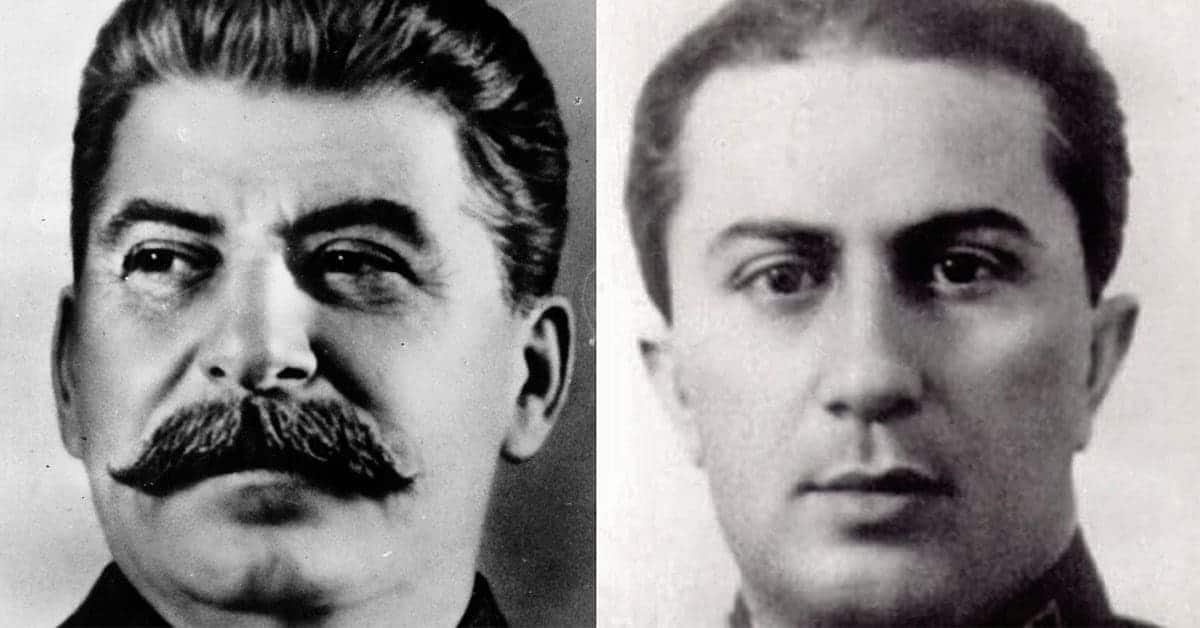Stalin’s many crimes are well documented. Decades of scholarship has documented his political actions and the murderous ruthlessness with which he achieved his goals. Far less is commonly known about his family life. Unfortunately, an exploration into the way in which he treated his family often mirrors the way in which he treated the millions of strangers which perished within the Soviet Union due to his actions. The tragic life of Stalin’s eldest son is a prime example of Stalin’s nearly inexhaustible cruelty towards his own family.
Yakov’s relationship with his infamous father was tense from the beginning. Yahsa, as he was often called, was, in many ways, the opposite of his domineering father. “He was a deeply peaceful person – soft, a little clumsy, very quiet, but inwardly solid and committed. He had nothing in common with his father except the almond-shaped Caucasian eyes. He was modest, simple and hard-working“, Yakov’s half-sister later recalled.
Perhaps his inward demeanor was the product of a mother that died of typhoid when he was only 8 months of age. His father, then still using his given name, Iosif (Joseph) Dzhugashvili was an absent father, all but ignoring his first-born child in favor of his Marxist revolution. Life with his father never improved. In fact, it only got worse, reaching new heights in the dreadful killing fields of WWII’s Eastern Front.

In a very real sense, Yakov’s fate was sealed the moment he was born to Stalin, but the more immediate events which surround his death came as a result of what Russians to this day call the Great Patriotic War. The invasion of the Soviet Union by Nazi Germany in June of 1941 constituted the some largest military engagements of WWII. Initially, German success was so rapid that it seemed like the blitzkrieg would soon conquer yet another country.
The Soviet military was in the midst of a massive collapse, weakened by a series of deadly personnel purges in the 1930’s. Stalin himself was in shock and could not be shaken from his nearly catatonic state for days. But the Soviet Union was a massive country and no matter how much territory the Germans conquered, seemingly, more country lay ahead, yet to be seized.
Eventually, Stalin awoke from his paralysis and rallied the Soviet war machine to make a stand; first at Moscow and then, Stalingrad. The German blitz finally stalled at the massive city on the river Volga during the summer of 1942. The German military command believed most major war objectives would be achieved by the winter, but as the year came to an end, the fighting was still fierce – with no end in sight. The invaders and the invaded both settled in for the greatest and longest battle of the war.
Arguably, this fatefully disastrous invasion began a clash between two of the greatest mass-murderers of the 20th Century. The ensuing bedlam tore apart families, destroyed the countryside and created deep heartaches for all involved. Though the personal tragedies of this terrible time are countless, one high-profile family struggle stands out – that of Stalin and his eldest son.
It was during this time that Yakov was thrust into an international game of secret diplomacy, propaganda and callus cruelty. Years before, Yakov joined the Soviet military, perhaps in an attempt to distinguish himself from his father’s looming reputation. Refusing special treatment, he advanced through the military like all others, achieving the rank of Lieutenant in 1940 and receiving a command just a few weeks before Hitler’s invasion. Not able to see his father before he was sent to the war front, Stalin simply commanded him to “Go and fight“, over the telephone.
According to declassified Soviet documents, Yakov refused special treatment even in the midst of mass chaos during those first few weeks. An official letter written to the Political Director of the Soviet Army stated that attempts were made to put him into a safer staff position. Yakov replied: “I will only return with my battery“. He made the decision to fight despite documents from his combat division worriedly stating that “Some 300 men are missing…” all from leadership positions, as well as “800 noncommissioned officers…” The report goes on to state that “35% of the planned trucks are missing, only 24% of all tanker trucks are here, and only 53% of armored vehicles”.

Regardless of Soviet efforts, soon, whatever men and equipment were present were quickly defeated by a much more competent German force. Less than a month after the initial Nazi invasion, the whereabouts of Yakov and his entire regiment were unknown. Since Yakov was the son of the most feared man in the country, multiple searches were initiated, in a desperate bid to find his whereabouts. It did not take long before a lead was found. The searchers found a soldier who was recently with Yakov.

